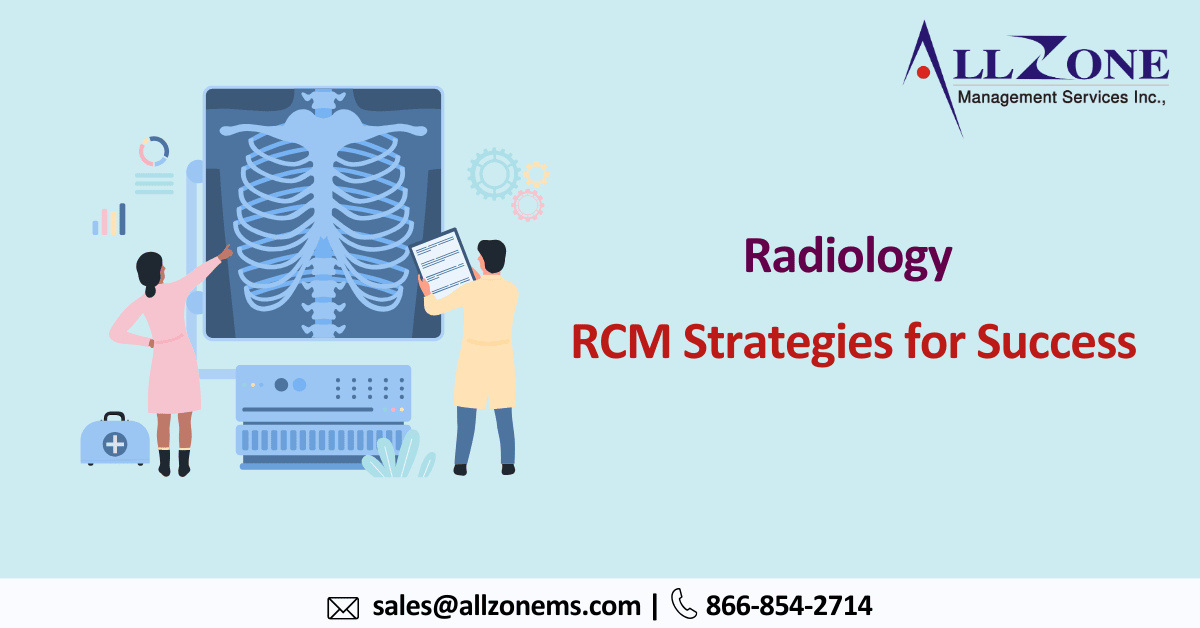The field of medical Specialties, with its cutting-edge technology and intricate procedures, presents a unique environment for radiology RCM.
While it offers the potential for significant success, navigating the RCM landscape in radiology requires a keen understanding of the industry’s specific challenges. This includes navigating the complexities of billing and coding, keeping pace with evolving regulations, and strategically leveraging new technologies.
RCM: Beyond Keeping the Lights On
For radiology departments and practices, RCM isn’t simply about maintaining operations; it’s about thriving in a complex ecosystem that revolves around patient care, billing accuracy, and strict regulatory compliance. In recent decades, advancements like AI-powered diagnostics and telehealth integration have not only transformed patient care but also introduced new layers of complexity to the RCM equation.
Challenges Unique to Radiology RCM
Radiology practices face several RCM hurdles that are amplified by the specialty’s unique nature. Here are some key challenges:
- Billing and Coding Complexities: Radiology coding is highly specialized, requiring in-depth knowledge of an ever-expanding catalog of procedures and their corresponding codes. Even minor coding errors can lead to claim denials, underpayments, and potential compliance issues.
- Regulatory Labyrinth: Keeping up with ever-changing healthcare regulations is an ongoing battle. Recent changes, such as the 2024 Medicare Physician Fee Schedule final rule, have resulted in reimbursement reductions (around 3.37% overall). Interventional radiology saw an even steeper decline (around 4%), impacting referral management, compensation structures, and ultimately, RCM strategies.
- Technology’s Double-Edged Sword: Technological advancements hold the promise of streamlining RCM processes, but they also come with a significant price tag for software, training, and cybersecurity measures. The rapid pace of technological change can quickly outstrip a practice’s ability to adapt, leading to inefficiencies and vulnerabilities.
Finding the Right Balance:
To navigate these challenges effectively, radiology practices must strike a balance between embracing technological innovation and maintaining accurate, compliant, and patient-centric billing and coding practices. The current state of RCM in radiology can be described as cautiously optimistic. While practices grapple with these challenges, they also look forward to the potential that lies ahead.
Keys to Success in the Future of RCM
Radiology practices must remain vigilant and proactive to adapt to upcoming changes in billing and reimbursement processes. This includes staying informed about potential shifts in Medicare and Medicaid reimbursements, evolving compliance requirements, and the impact of healthcare reform initiatives. Here are some additional key strategies for navigating the future of RCM successfully:
- Invest in Ongoing Education: Regular training in coding and billing practices for staff is crucial.
- Leverage Technology Wisely: Utilize technology to enhance efficiency and accuracy in RCM processes.
- Master Preauthorization: Develop effective strategies to manage payer preauthorization.
- Dedicated Denials Management: Establish dedicated teams to address denied claims effectively.
- Accurate Documentation is King: Ensure every procedure, diagnosis, and patient encounter is meticulously documented and coded for optimal reimbursement and minimal denials.
- Transparency Builds Trust: Provide patients with clear and understandable billing statements and openly communicate about their financial responsibilities. This fosters patient satisfaction, loyalty, and smoother billing processes.
A Holistic Approach for Financial Health
The cornerstone of effective RCM and the financial well-being of radiology practices lies in adopting a holistic approach. This means integrating RCM considerations into every aspect of the practice, from patient registration and scheduling to coding, billing, and collections. By viewing RCM as an integral part of the patient care continuum, practices can optimize their financial health while maintaining the highest standards of care.
Considering an RCM Company
The complexities of RCM in radiology can be overwhelming for in-house staff. Partnering with a reputable Allzone’s RCM company can be a strategic solution. Allzone’s specialize in navigating the intricacies of radiology billing and coding, ensuring compliance, maximizing reimbursements, and ultimately, improving the financial health of your practice.

